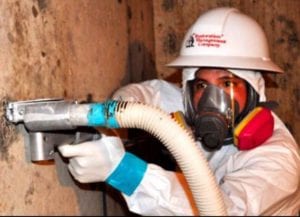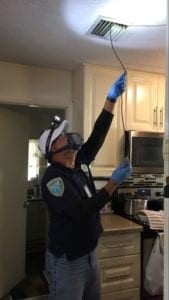
It’s well known that exposure to mold in your house or workplace can negatively impact your health. But if left unaddressed, it can also damage the value of your property.
Microscopic organisms belonging to the fungi family, mold reproduces though airborne spores and can propagate on almost any surface. It most commonly thrives in humid, warm and damp environments.
That means homes in Miami are especially susceptible to mold growth, particularly in places where excessive moisture accumulates—pipes, bathrooms, air conditioning units, vents, washers, inside walls and in between roofs and ceilings.
“Southeast Florida is the only locale in the U.S. with a tropical climate,” said Dr. Gary Rosen, a Florida-licensed building contractor and accredited mold remediation instructor. “The climate is ideal for hidden mold growth.”
Common types of mold include aspergillus, cladosporium, alternaria, penicillium and stachybotrys (also known as “toxic black mold” and “the silent killer”). Such types are associated with an array of health risks including respiratory difficulties, fatigue, immune suppression, chronic nasal congestion, sinusitis, eye irritation, rashes, eczema, fever and, in rare instances, even death.
Florida law requires home sellers to disclose all facts and conditions about their property that might affect its value or demand in the marketplace (Johnson v. Davies; 1985). This includes any current or pending legal claims against the property, environmental hazards and any infestation or damage.

If properly diagnosed and removed, past mold growth in your home may only result in a checkmark on your property disclosure statement. But if it remains untreated and is discovered during a sales transaction by a property inspector or appraiser, your house’s value will plummet and could remain unsold on the market until the problem is addressed.
Mold presence is an indication of previous or existing water damage to your home due to condensation from poor ductwork, inadequate air flow soffits, structural damage, cracks in the foundation or improper insulation. Approximately $2.5 billion is lost per year in the U.S. because of water damage, with the average cost of a home water damage insurance claim being close to $7,000, according to insurance industry estimates.
“To avoid any problems, it is crucial that you request a full inspection of your home by a state-certified environmentalist before putting your house on the market,” said Marty Katz, a state-certified mold inspector and remediator with more than 23 years in the field. “Realtors are aware of the problems mold causes and is an indication of, and we’ve recently seen a more-than 200 percent increase in requests for mold clearance certificates.”
Affordable, effective solutions are available. If you suspect your home may be harming you due to mold and other airborne contaminants, it is recommended you contact a company with state-licensed mold remediation technicians.
For more information, call 305-763-8070, visit <www.MiamiMoldSpecialists.com> and follow @MiamiMoldSpecialists on Instagram.







Comments are closed.